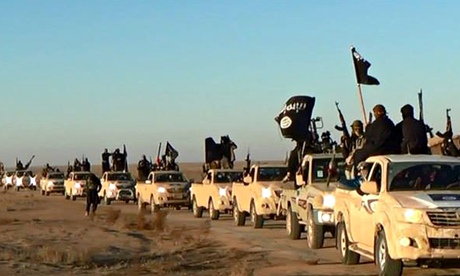U.S.A. There is a wealth of information circulating on the web about a terrorist group with mass territorial gains calling itself the Islamic State in Iraq and Syria (often referred to simply as the Islamic State). Senator John McCain says the organization “is more dangerous than al Qaeda.” U.S. President Barack Obama believes that the organization is a “cancer” that must be exterminated, yet refuses to escalate an American response beyond targeted airstrikes such as troop deployment. Others call the group an “insurgency,” that requires ground troops and nation-building—a “hearts and minds” campaign that General David H. Patraeus was so proud of—to effectively remove ISIS from the region. In fact, the vast majority of Iraqis that have joined ISIS are former members of Saddam Hussein’s Sunni Baath Party and the Iraqi army prior to the U.S. led invasion. These men have been not only disenfranchised by the U.S., who disbanded the Iraqi army and instituted the process of “de-Baathification,” but soon came to the realization that Maliki’s government was doing the same.
Despite calls from the Obama administration and members of Congress urging the newly elected Iraqi President Fuad Masum to create an inclusive, multi-ethnic coalition government to generate legitimacy, the Iraqi government continues its old ways. In reality, this is no easy task. Kurds, Shiites, Sunnis, Yazidis and Christians are just a few of the many groups vying for the control of Iraq. In fact, the current political situation in Iraq is not unlike that of the country prior to the 2006 “surge” of additional U.S. troops to implement counterinsurgency doctrine. Many realize that ISIS has capitalized on the violence, but don’t realize that the sectarianism resulted from an abrogation of U.S. diplomatic relations in Iraq. When President Obama withdrew U.S. troops in 2011 after then President Nuri al-Maliki refused to sign a Status of Forces Agreement (SOFA). The Obama administration has not kept in touch with the Iraqi government, leaving many in the Iraqi leadership to resort to the common sectarian politics of their predecessor. Maliki and the Shiite-led coalition reverted to sectarian politics, repressing members of the Baath Party. Today, some individuals are arguing for something really interesting—re-baathification—a process that would legalize the Baath party and motivate former Baathists to abandon the brutal terrorist organization and build a new political institution in Iraq. De-baathification is based on the de-nazification model used by the U.S. in the occupation of Germany after the Second World War. This political model was viable for many reasons, including the fact that the U.S. occupied the states for over a decade and kept German leaders on a very short leash. This, of course, didn’t happen in Iraq, where the lack of a proper occupation resulted in the formation of an insurgency and an alienating political institution. So, in many ways, U.S. disengagement in Iraq has resulted in the current situation.
Another myth about ISIS, is that it is “the most dangerous terrorist group on the planet.” This is a bit of an overstatement, no? None would dispute that the vast territorial gains made by the Islamic State are threatening and worrisome. But if you analyze the territorial gains made by the group, their expansion might actually lead to their downfall. Non-state groups that seek to assert their authority over the host government must provide their constituents with money, resources, and public services to generate legitimacy, something that ISIS is indeed trying to do. However, if they are allocating money and resources to hold on to territory, they are allocating less to expand their reach.

